Righting Wrongs (1986)
Directed by: Corey Yuen
Written by: Barry Wong, Cheuk-Hon Szeto
Starring: Corey Yuen, Cynthia Rothrock, Melvin Wong, Yuen Biao
AKA ZHI FA XIAN FENG, ABOVE THE LAW
AVAILABLE ON BLU-RAY, DVD and DIGITAL
RUNNING TIME: 100 mins [Mandarin / Singapore Cut], 96 mins [Hong Kong Cut], 92 mins [International “Above the Law” Cut], 106 mins [Ultimate Cut combining footage from the Mandarin / Singapore and Hong Kong Cuts]
REVIEWED BY: Dr Lenera
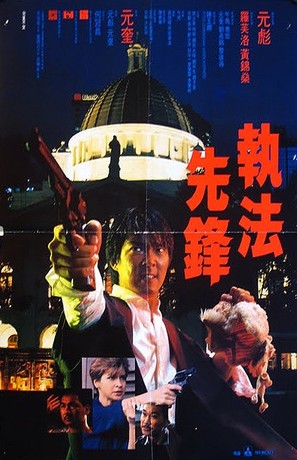
Ha Ling-ching is a dedicated, by the book prosecutor who’s tried to maintain patience and tolerance under the somewhat flimsy laws of the court. However, when his mentor is publicly gunned down in New Zealand and the key witness of his latest case and his entire family are murdered, Ha can no longer go by the book and, encouraged by a judge, sets out to kill the two men he believes called for his witness’ murder. However, when he gets to the second man, somebody else, sent by a mysterious villain known only as “Crown”, has already done the job, while Senior Inspector Inspector Cindy Si is put on the case and soon works out what Ha’s up to. However, how can she arrest Ha when she has no proof and he’s so hard to keep up with….
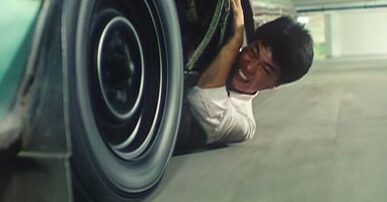
As I’m sure fans of the genre will know, in addition to Eureka, 88 Films has also been releasing Hong Kong action movies in stonking Blu-ray editions and, even though we don’t get sent review copies of these, I’ve been doing writeups on the ones I have time for. Righting Wrongs was released on disc some time before Yes, Madam! which I reviewed recently, but it was made afterwards, so I’m glad that I’ve come to it later. The two films are similar in many ways, though having now watched Righting Wrongs for the first time in a great many years, I think that it’s the superior product, even though Yes, Madam! remains more important because it began the “Femme Fatale” subgenre. The storyline is considerably better and keeps on delivering turns instead of petering out, there’s more action which is fairly evenly placed throughout while still never taking over from the plot, and the humour is better entwined with the plot and the action, even if rather less of it is actually funny which is one thing that Yes, Madam! does have in its favour. Yes, Madam! spent much of its time cutting between two different if related storylines, Righting Wrongs has a considerable number of main characters but keeps everyone and everything together better. It’s as if director Cory Yuen and co-screenwriter Barry Wong were consciously trying to better the earlier film. Probably the most seen Yuen Baio starrer outside of some Jackie Chan and Sammo Hung films, it has the least popular of the “Three Brothers” deliver a performance which is very good both acting-wise and action-wise while giving Chan a run for his money in terms of crazy stunts. As for his co-star Cynthia Rothrock, she doesn’t get quite as much action to do as Baio and is saddled with a ridiculous amount of makeup, but it may still be a better showcase for her skills than Yes, Madam! It even attempts a small amount of discussion on the nature of justice; it goes no deeper than, say, Magnum Force, but it’s there.
Golden Harvest originally signed Rothrock to play the chief villain opposite Chan in Armour of God, but when production halted due to Chan’s near-fatal filming accident, the studio reassigned Rothrock to Righting Wrongs. While practicing her moves, she injured her right anterior cruciate ligament; rather than take time off to undergo surgery, she just used her left leg for her kicks. As for Biao, he sustained a back injury while when jumping off the second story of a house, despite landing feet-first on some padding. Some filming was done in New Zealand, but restrictions there meant that he wasn’t allowed to do the start of a jump from a plane, though he died the rest, and at one point the wire supporting him snapped and he landed face-first upon the mattress padding with his lower body bent over top of him, prompting crew members to fear he’d broken his spine. It was Rothrock who suggested Karen Shepherd when a female martial artist was required; however, Shepherd refused to let her character commit a particularly cruel killing and die, so Yuen finished her scenes with doubles and clever editing. The original very downbeat ending where virtually everyone is killed was met with a negative reception during its first screenings in Hong Kong; because of this, Rothrock stopped filming China O’Brien and flew from Los Angeles to Hong Kong to reshoot the ending for the Mandarin and International versions, the former having Ha sentenced for life and the latter just eight years. The Mandarin cut added some scenes, including three with Rothrock and one with Fan Siu Wong and his character’s mute grandfather showing that he’d been stealing to feed him, while the International one unsurprisingly removed most of the Mahjong game sequence from Rothrock’s opening scene, plus the interrogation scene with Bad Egg and the felon who assaulted a “white woman”, and replaced Ha escaping Si’s custody with Ha going into custody voluntarily. Both cuts miss some violent shots from the Hong Kong version.
So we begin at “The Supreme Court of England”, and a nicely set up and edited opening scene despite the not quite successful efforts of the synthesiser used on the soundtrack to match the sounds of a real accordion being played by one of three waiting gunmen. Ha is walking out of the courthouse with his unnamed mentor, who tells him “But you have to do what’s necessary, deal with those low-life scum balls” before being shot dead, leading to a car chase which, even though I’ve never been to New Zealand nor am I knowledgeable about any New Zealand geography, seems to jump from locale to locale [though it’s not quite a Killer’s Romance situation, long time Hong Kong movie fans will know what I’m referring to] until Ha shoots at the driver of the other day, causing it to flip over so he can more easily shoot at the engine and thereby blow the car up [the Mandarin and International versions have it just blow up by itself]. Meanwhile in Hong Kong another gunman shoots three guys in an apartment right in front of their families, one of whom is the sole witness in Ha’s case against drug runner Chow Ting-Kwong, before blowing up the place, killing everyone else. Unusually for a Hong Kong film, the executioner is played by a black guy, martial artist Peter Cunningham. Ha’s case is now dead, and he isn’t happy, but his judge friend understands the problem, and says to him “I do have a way to solve ours” while pretending to shoot Chow and his aides through a window with a fake gun. This second bit of encouraging is all Ha needs, and after a bit of brooding including a flashback, he Rambo’s up and sets off to kill Chow’s assistant Wei Shing. Hsia drops off an office building’s roof attached to a line, bursts through a window, beats Wei and strangles him to death, then drops face first to street level, arriving smoothly and safely at the bottom!
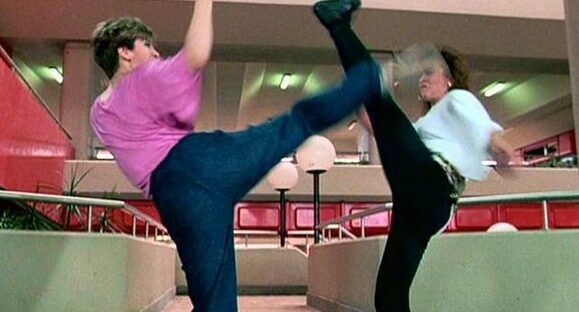
Rothrock gets another cool introduction, ramming a chair leg onto the foot of somebody trying to pull a gun out of a shoe on her in a mahjong bar before defeating four “shoeshine boys” [in a film where a young boy introduce himself as “Fatty” and have it not even meant as humour because Hong Kong folk often address each other by their appearance] and handcuffing them together in a blistering little fiight with Rothrock spending most of it on tables. Cindy then meets her new partner Bad Egg after letting him embarrass himself by talking about white women in a derogatory way in Chinese which, actually, she does understand. Bad Egg’s father Tsai tells Cindy “Don’t let him do anything dangerous, he is my only child”, so Cindy does most of the work. She figures out that Tsai’s the culprit from finding a parking ticket with his name on it in the area where Cheng was killed, an area where the ticket inspectors are fanatical about their job in one of the weaker pieces of plotting in the story. She visits him at his apartment and the two debate the validity of vigilante action in a lawful society, Cindy refusing to acknowledge that you should ever take the law into your own hands. Meanwhile Chow is shot dead by the even more villainous Crown, and when Ha shows up at Chow’s place, Cindy gets there very soon after, surprising him. Hsia manages to handcuff Cindy to a rail and make a getaway, and when Cindy shows up at one of Ha’s court dates, intent on arresting him, Ha’s judge mate [a typically note perfect Roy Chaio] has a fake alibi for him, though in a nice touch he does the sign of the cross afterwards. Worse than that, Crown is also Cindy’s superior Wong Ching-Wai! It’s really stacking up against Cindy, though there’s a witness to Chow’s killing, a petty thieving kid called Sammy Yu Chi-Man, who might be of help, if she can actually get to him. The resolving of things isn’t as predictable as you might expect, with a lot of deaths.
The amount of action seems to me to be just right in a movie of this sort, frequent but never so much that we lose sight of the plot. Soon after Rothrock’s first fight, Baio’s character is surprised by some bad guys in cars in a carpark; he avoids cars with typical dexterity before things more involve people and Baio engages in the others in a baseball bat battle. I’d have liked it to have been longer, but never mind, you’ll remember the shot of Baio narrowly missing having two cars crash into him and into each other instead while he gets dragged along, and the cameraman seeming to almost get hit, for ages. We soon get Baio vs Rothrock as Cindy tries to arrest Ha who doesn’t want to injure Cindy so keeps taking flight. It’s not a full-on battle and uses as much street brawling elements as martial arts but Rothrock really impresses being able to not look poor next to the incredible acrobatic skills of Baio. Then Wong sends the same guy who killed that witness and his family to kill Ha, so we have Cunningham getting some really good moves in, though his opponent soon gets the upper hand as a lot of glass is smashed and crashed through. Not long after that we come to the Rothrock/Shepherd fight, proceeding by a chase including some hurtling down and across escalators and, despite the issues while shooting it, it’s wonderful. It’s obvious to the keen-eyed that Shepherd is less proficient, but this expertly disguised by Rothrock doing lots of avoiding, which of course means mostly leaping onto things, then Shepherd pulling out a chain whip which she uses with flair. Woman vs woman heaven! Cindy is victorious and beats some more guys too, but can’t do much against Wong until Ha turns up, and the Baio / Melvin Wong fight is nicely fast and brutal [and may have been shot by Sammo Hung] until Wong turns tail and we get that airplane sequence. Yes, it’s Baio hanging onto that rope.
The comedy is only in short scenes, which might be just as well seeing how much of it falls flat, such as Bad Egg’s scruffiness and being targeted by a tough ticket warden, though the relationship between Bad Egg [played by Yuen] and his father, also a cop and played by Wu Ma, is quite touching. Was an “apple up an exhaust pipe” gag borrowed from Beverley Hills Cop? As with Yes, Madam!, there’s some viciousness present, in fact there’s more, with several pretty bloody killings where blood flows. Chow’s death is especially nasty. The amount of tragedy, even if you watch the lighter finale, is surprising, so a case can be made for the darker ending being more appropriate. Baio is a delight to watch as, like Chan, he jumps and climbs about with absurd ease, yet his performance is unusually hard-edged throughout. His character’s house is absolutely huge, do they pay prosecutors that well in Hong Kong? And is that him doubling for Rothrock a few times? Sammy’s character is a bit irritating and you may hope that the villains get him, though that scene cut from the Mandarin version when he tells him he steals food for him rather moves. James Tien is on villain duties again, while Romeo Diaz’s music score is again beaty synthersisers, here sometimes with saxophones, and about as ’80s as you can get. Yuen’s direction isn’t the same as his work on Yes, Madam! – he moves the camera about more during the fight sequences and perhaps rather overdoes slow-motion for dramatic effect. Still, he generally does an impressive job on this fine actioner which I feel has been underrated and borders on being a genuine classic. The best version on the 88 Films set is the Ultimate Cut which combines all footage [with no slowing down of pace] and lets you select your own ending!





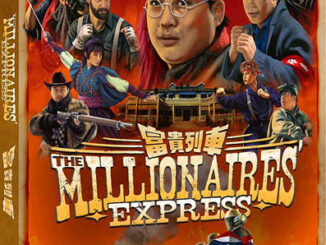
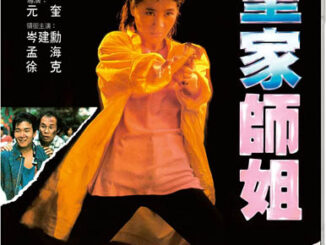
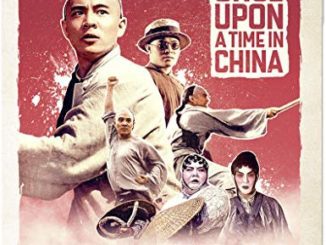
Be the first to comment